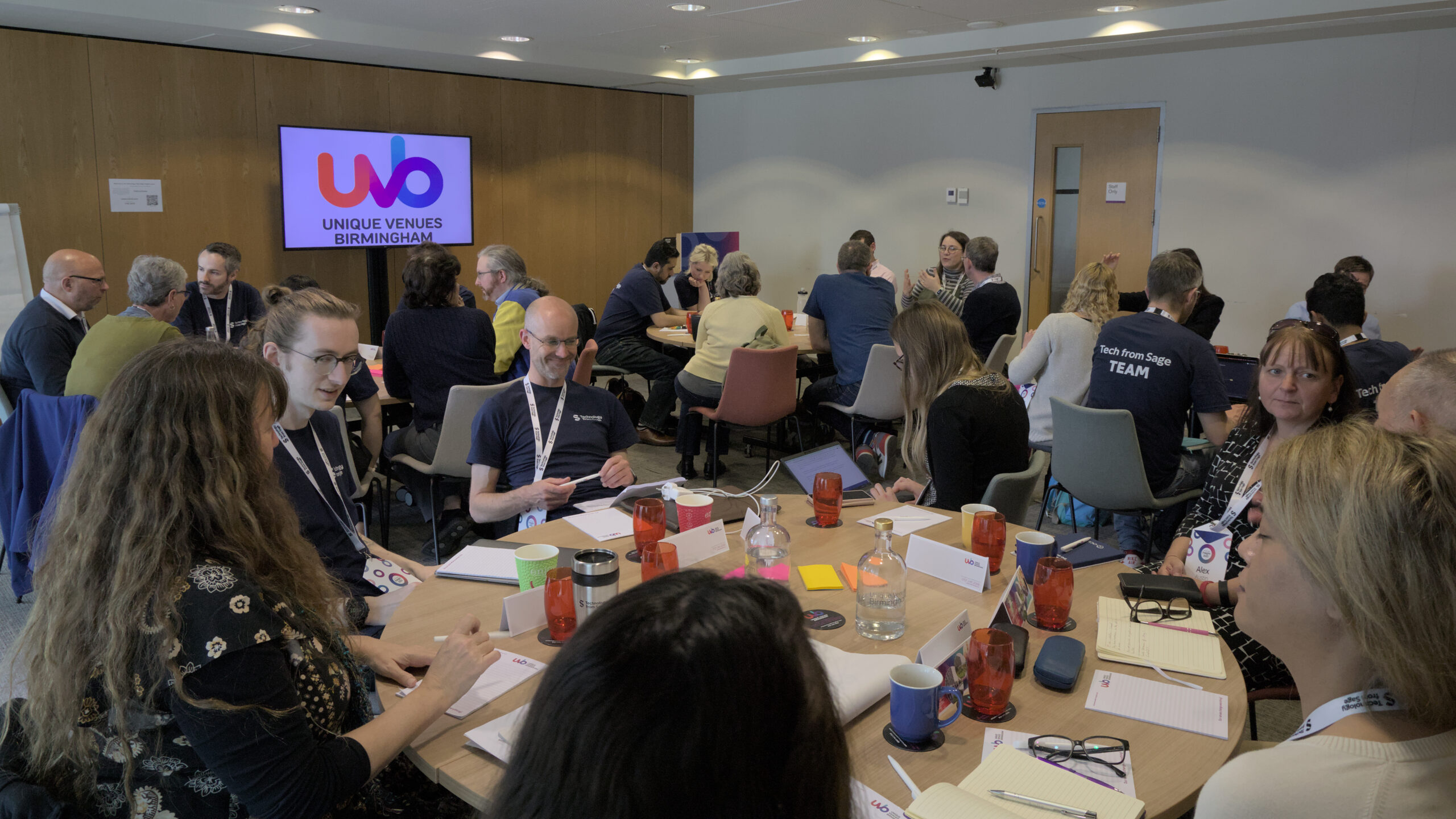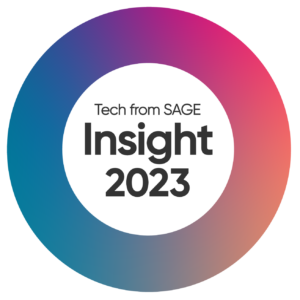
We recently held our inaugural Tech from Sage Insight conference, a two-day event held in Birmingham, bringing together Technology from Sage staff, academic librarians, students and thought leaders from across the higher education sector. At the event, members from Technology from Sage’s Tech Team hosted a ChatGPT and Generative AI Co-design Challenge: How can we address the risks and benefit from the opportunities? breakout session with librarians. As technology continues to advance, artificial intelligence (AI) is making its way into various aspects of our lives, including the field of education.
Benjamin, Nadeem, Richard and Alex from Technology from Sage’s Tech Team have shared the discoveries from the workshop in this blog post. They’ll explore the effects of AI on assignments and assessments in educational settings; from AI-powered answer generation and checking to the digitization of resources and examine the advantages and challenges that arise from integrating AI into the learning process.
AI has the potential to revolutionize the way students answer questions. With AI algorithms, students can receive immediate assistance in formulating well-structured and accurate responses. AI can analyze the question, identify relevant keywords, and suggest appropriate answers, providing a valuable resource for students to enhance their learning experience.
Additionally, AI-powered tools, similar to Grammarly, can assist in checking the accuracy and clarity of students’ answers. These tools can help students identify grammatical errors, enhance their writing style, and improve overall academic performance.
One challenge with integrating AI into education is the dated nature of training materials. As AI relies on vast amounts of data, outdated training materials can lead to inaccurate or fictional references. Educational institutions need to ensure that the data used to train AI models is up-to-date and relevant to avoid misleading students.
Another area where AI can be beneficial is link validation in reading lists. Currently, identifying broken or outdated links is a manual and time-consuming process for librarians. AI-powered algorithms can automate this task, making it easier to ensure that students have access to reliable and up-to-date resources. Additionally, AI can assist in automating purchasing needs, enabling institutions to make cost-effective decisions by comparing prices and suppliers.

AI can play a significant role in improving content discovery for students. By analyzing user preferences, reading histories, and academic requirements, AI algorithms can provide personalized and accurate recommendations for further reading. Similar to Netflix’s recommendation system, AI can suggest relevant resources that align with a student’s interests and academic goals.
Furthermore, AI can help address the issue of bias in resource collections. By considering a broader range of factors beyond just keywords, AI algorithms can provide more diverse and unbiased content recommendations. Cross-institution and cross-department recommendations can also facilitate interdisciplinary learning and collaboration.
The digitization of resources brings accessibility benefits to students. AI can assist in formatting resources to meet accessibility standards, such as providing image alt text for visually impaired students. However, challenges arise in accurately converting scanned chapters to digital format, especially with complex elements like tables and graphs. Librarians may face difficulties in identifying issues with Optical Character Recognition (OCR) and ensuring the quality and usefulness of digitized content.

Live chat and chatbot services have become popular ways for students to seek assistance. AI-powered chatbots can handle frequently asked questions, reducing the workload of librarians and providing immediate responses to students’ queries. However, there may be a lack of trust or enjoyment in using chatbots, highlighting the importance of improving their training and performance.
The COVID-19 pandemic has further accelerated the adoption of chat services, with some institutions implementing 24/7 support from American universities. There is also potential in training AI models on librarian knowledge bases to provide more accurate and tailored responses to student inquiries.
Educational institutions need to adapt assessments to account for the influence of AI and prevent academic dishonesty. While plagiarism has always been a concern, the use of AI raises questions about the reliability and fairness of traditional assessment methods. Assessments should aim to test understanding in ways that AI cannot currently replicate.
Some interesting remarks were made on a more global approach to AI from educational institutions; while some are resistant to it, and the avenues it opens up to students in the form of plagiarism, AI will be an everyday tool employed in the job market by the time they graduate/enter the workplace. By depriving students of these tools in academia, are institutions restricting the skillsets of individuals further down the line?
Just as when search engines became mainstream, and created concerns over plagiarism and how these tools will be used within the context of education, AI provides both concerns and opportunities.”
ALEX, SENIOR PHP ENGINEER
Click below to access all of the Tech from Sage Insight 2023 recordings:
Librarian Futures: In Conversation with Patrons July 10, 2023

We recently held our inaugural Tech from Sage Insight conference, a two-day event held in Birmingham, bringing together Technology from Sage staff, academic librarians, students and thought leaders from across the higher education sector.
At the event, EdTech Success Consultant, Matthew Weldon, spoke with Samantha Sharman (student at the University of Lincoln) and Professor Jamie Wood (University of Lincoln) about the key takeaways from part two of our Librarian Futures series of reports. We’ve summarized some of the main points from this thought-provoking session below, as well as provided audio excerpts from our speakers.
Check out the recording from our session at Tech from Sage Insight below:
Our research shows that most students are using Google while during their research, and a plurality go to Google first. Our panelists were not surprised by this, and agreed that academic libraries have a crucial role to play in addressing this. Libraries can empower students by training them to use Google effectively, ensuring that students are equipped to navigate through the vast sea of information and access credible sources.
We also found that students do not identify librarians as having helped them across a number of categories, including reading academic literature. Jamie Wood described how signposting, integrating library resources into modules, and modelling the value of the library might contribute to a better understanding of the role and value of the library among students. Samantha Sharman then described how big a difference being taught by a librarian has made to her studies.
We asked whether, as technology continues to evolve, libraries should be involved in addressing emerging tools like ChatGPT. Our panelists discussed how educating students on how to use such technologies effectively and ethically is essential to promote responsible academic practices, and how by providing guidance on the appropriate use of ChatGPT and fostering discussions on the topic, libraries can help students navigate the ethical challenges inherent in using these technologies.
In our session, we discussed at length the pivotal role that libraries have in supporting students and academics, especially in the digital age. However, as our Librarian Futures series highlights, to provide the appropriate support to students means that librarians must address the bidirectional knowledge gap that exists between librarians and their patrons. We’re grateful to Samantha Sharman and Professor Jamie Wood for joining us at our Insight event to discuss their thoughts on the knowledge gap and the future of the academic library, and we’re excited to continue to work with and support librarians and library patrons.
Click below to access all of the Tech from Sage Insight 2023 recordings:
A Day in the Life, with our Customer Success Consultant, Julia Dougherty July 6, 2023
At Technology from Sage our purpose is to support libraries in advancing teaching, learning and research. We can’t achieve this mission without the work of the talented team at Technology from Sage, so we’ve launched a series of posts for you to find out more about the team.
In this A Day in the Life post, we’re joined by our new Customer Success Consultant, Julia Dougherty at Technology from Sage. Read on to find out more about Julia – including what it’s like starting a new role remotely, her librarian background and love of thrifting!

Hi everyone! I am the newest Customer Success Consultant on the Technology from Sage team based in Houston, Texas.
Right now I’m onboarding, but I’m looking forward to working with and supporting current Technology from Sage clients daily via support, regular calls, and catch-ups.
I’m most excited to combine my librarian experience with my sales and customer support experience in this role. I look forward to speaking to people in the academic library space every day!
I am pretty new to both Talis and Technology from Sage, so that’s yet to be seen! I can definitely say I appreciate the open communication channels we have between teams.
I am directly involved with the Operations team. Although it can be complicated to connect as a team that all live in different countries from yourself, it seems there are regular efforts to chat and catch up.
It can be a bit daunting to start a role on the other side of the Atlantic from the rest of your team and in different time zones from yourself. However, I enjoy getting to know people from around the world, and my team has been very supportive thus far.
I’m a lover of music and have played piano for over 10 years. I also love traveling, dogs, and thrifting.
If you have any questions, feel free to email me at Julia.dougherty@technologyfromsage.com. Cheers!